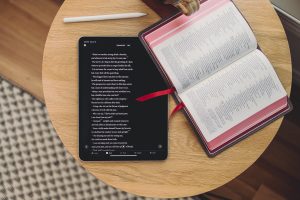
Shownotes
Welcome to Day 1474 of our Wisdom-Trek, and thank you for joining me.
This is Guthrie Chamberlain, Your Guide to Wisdom
Bible Study – Discover The Meaning – Meditation Monday
Wisdom - the final frontier to true knowledge. Welcome to Wisdom-Trek! Where our mission is to create a legacy of wisdom, to seek out discernment and insights, to boldly grow where few have chosen to grow before. Hello, my friend, I am Guthrie Chamberlain, your captain on our journey to increase Wisdom and Create a Living Legacy. Thank you for joining us today as we explore wisdom on our 2nd millennium of podcasts. This is Day 1474 of our Trek, and it is time for Meditation Monday. Taking time to relax, refocus, and reprioritize our lives is crucial in order to create a living legacy. For you, it may just be time alone for quiet reflection. You may utilize structured meditation practices. In my life, Meditation includes reading and reflecting on God’s Word and in prayer. It is a time to renew my mind, refocus on what is most important, and making sure that I am nurturing my soul, mind, and body. As you come along with me on our trek each Meditation Monday, it is my hope and prayer that you, too, will experience a time for reflection and renewing of your mind.
We are continuing our series this week on Meditation Monday as we focus on Mastering Bible Study through a series of brief insights from Hebrew Scholar, Dr. Michael S. Heiser. Our current insights are focusing on study habits to build a strong foundation. Today let us meditate on:
Bible Study – Discover The Meaning
· Insight Nineteen: Bible Study Is About Discovering the Meaning of the Text, Not Deciding How to Apply the Text
Dr. Heiser shares this personal story to help understand this insight. I spent two summers during college as a pastoral intern. I enjoyed it, though the experience contributed to the realization that I wasn’t cut out for pastoral ministry. I knew my calling was different. Something I did during that time also taught me a lot about what Bible study wasn’t—or at least shouldn’t be.
One of the periodic tasks of pastoral interns was, unsurprisingly, preaching. We were allowed to pick pretty much any passage for a sermon and were given a generous amount of time to prepare. I had a couple of years of Bible college coursework under my belt, so I wasn’t new to Bible study. The only instruction that was given to me was that preaching wasn’t teaching. I understood the intent of the instruction: don’t turn the sermon into a classroom session. That’s good advice for several reasons. But it made the task incredibly difficult. I finally concluded that all I needed to do was go through the passage, make an observation here and there, and apply those observations to people’s spiritual lives—to our aspirations, failures, God’s forgiveness, and the need for consistency as followers of Jesus.
I understood the intent of the instruction: don’t turn the sermon into a classroom session. That’s good advice for several reasons. But it made the task incredibly difficult. I finally concluded that all I needed to do was go through the passage, make an observation here and there, and apply those observations to people’s spiritual lives—to our aspirations, failures, God’s forgiveness, and the need for consistency as followers of Jesus.
The formula worked wonderfully. I got a lot of positive affirmation from the pastoral staff and people in the pew. A couple of days later, though, I had an epiphany that soured the experience but was just what I needed. I realized that I had preached a well-structured outline, not the text. Instead of really grappling with the meaning of the text, conveying that to people, and then drawing out lessons rooted in the text, I had used the Bible to make people feel a certain way. They’d been challenged spiritually but hadn’t learned a thing about the passage. I had manipulated my audience when my job was to help them understand Scripture and respond to it in their walk with God.
Bible study shouldn’t be an exercise in being clever. When we look into Scripture only to jog our minds about what we’re doing right or wrong, or how someone else is pleasing God or not, we aren’t doing Bible study. Bible study should be about understanding what Scripture says and teaches. The Spirit will take the fruit of that labor and challenge hearts. We are no substitute.
· Insight Twenty: Don’t Allow Anyone to Protect You from the Bible

Here is another personal story as related from Dr. Heiser. I did my doctoral work at the University of Wisconsin-Madison and had four years of teaching experience by the time I left. One of the things I tried to instill in my students was they shouldn’t allow anyone to shelter them from difficult or controversial passages in Scripture, even from apparent conclusions that didn’t seem to align with their traditions. The Bible should be approached with openness. We must be willing for it to dictate the terms of what we believe rather than filtering it through denominational distinctions or ideas we prefer.
I had this lesson reinforced after moving and looking for a church to attend. We happened upon one that started to feel like a fit. The pastor had a degree from a well-known seminary and was a good speaker. His first two sermons from l Peter on our first two visits were reliable expositions. The people were friendly, and there were kids the same age as our own. It was even close to our apartment. Then week number three happened. It wasn’t pretty.
Our third visit coincided with the pastor preaching on 1 Peter 3:14-22, a very odd passage that is one of my favorites. What happened next is something I’ll never forget. The pastor took the pulpit and said with complete sincerity that he was skipping the passage. He transparently explained that it was too strange to understand and, so far as he could tell, had no vital role for theology.
The incident sticks with me for several reasons. The complete, unabashed surrender to ignorance was troubling enough. More disturbing was the mixed message his decision telegraphed. The church was in a tradition that was heavily invested in a handful of modem creeds. His decision either implied that passages that were “consistent” with creedal formulations somehow had more to offer. The other possibility is that the people in the pew needed protection from their own Bible lest they somehow be doctrinally “confused” by the material the creeds hadn’t made digestible for them.
When we do Bible study, we are often helped by the words of men and women who have devoted themselves to biblical scholarship. The proper object of Bible study is the biblical text. We do not need to be protected from Scripture. We need to be dedicated to understanding it—all of it.
Study this Book of Instruction continually. Meditate on it day and night so you will be sure to obey everything written in it. Only then will you prosper and succeed in all you do.
That is a wrap for today’s Meditation. Next week we will continue our trek on Meditation Monday as we take time to reflect on what is most important in creating our living legacy. On tomorrow’s trek, we will explore another wisdom quote. This 3-minute wisdom supplement will assist you in becoming healthy, wealthy, and wise each day. Thank you for joining me on this trek called life. Encourage your friends and family to join us and then come along tomorrow for another day of ‘Wisdom-Trek, Creating a Legacy.’  If you would like to listen to any of the past 1473 daily treks or read the daily Journal, they are available at Wisdom-Trek.com. I encourage you to subscribe to Wisdom-Trek on your favorite podcast player so that each day will be downloaded to you automatically.
If you would like to listen to any of the past 1473 daily treks or read the daily Journal, they are available at Wisdom-Trek.com. I encourage you to subscribe to Wisdom-Trek on your favorite podcast player so that each day will be downloaded to you automatically.
Thank you for allowing me to be your guide, mentor, and most importantly, I am your friend as I serve you through this Wisdom-Trek podcast and Journal.
As we take this Trek of life together, let us always:
- Live Abundantly (Fully)
- Love Unconditionally
- Listen Intentionally
- Learn Continuously
- Lend to others Generously
- Lead with Integrity
- Leave a Living Legacy Each Day
I am Guthrie Chamberlain….reminding you to ’Keep Moving Forward,’ ‘Enjoy your Journey,’ and ‘Create a Great Day…Everyday’! See you tomorrow!